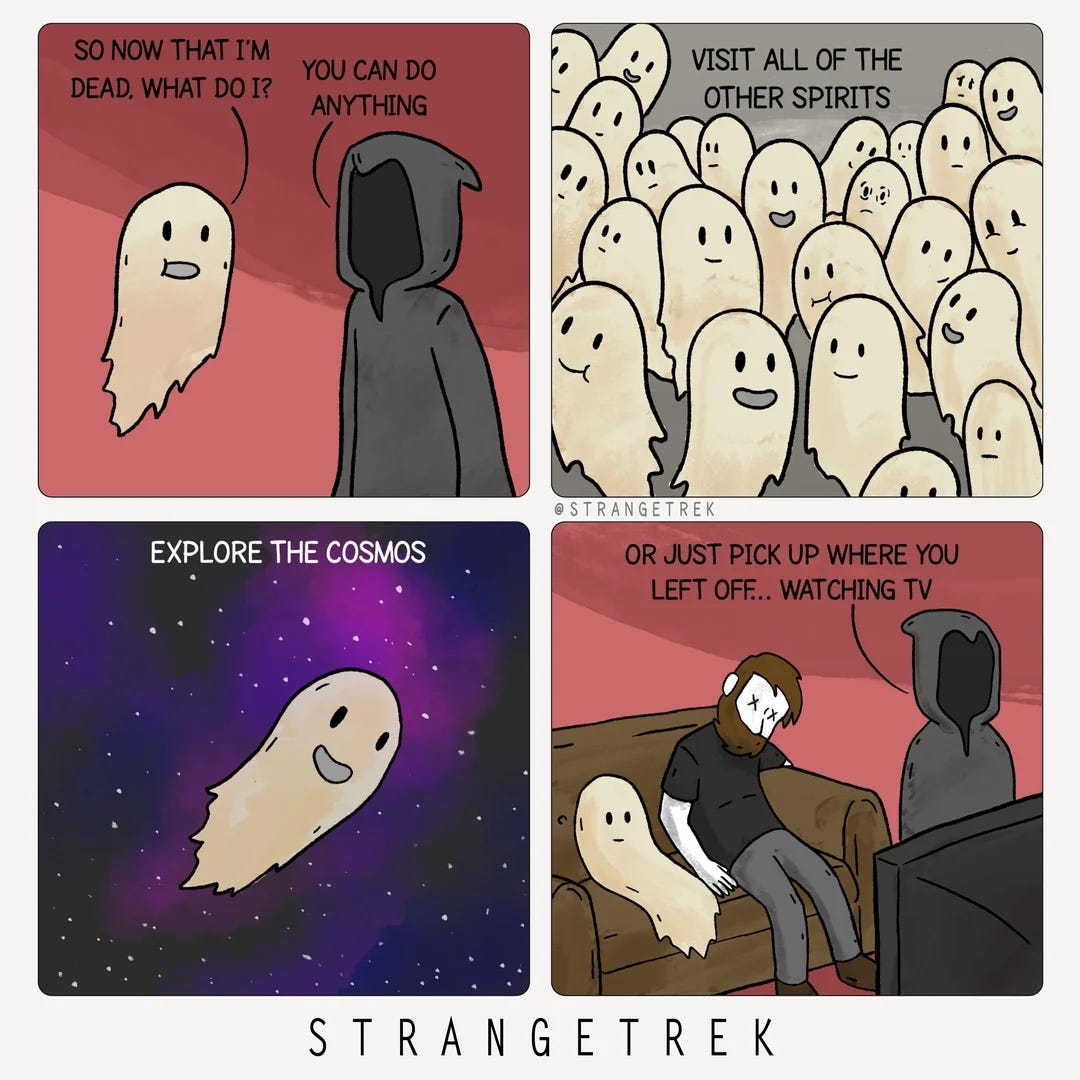What we leave behind
A philosophical inquiry into being dead (active) and being dead (passive).
I told you there would be more on death soon—it’s soon. Death has been top-of-mind for me recently for a number of ✨ personal life reasons ✨ as well as for a number of ✨ academic writing reasons. ✨ I am strategically ignoring the former by funnelling it all into the latter (an excellent coping mechanism recommended by 9/10 academics). Fortunately (or unfortunately), that means more Weird Stuff for you to read.
“The way I see it, being dead is not terribly far off from being on a cruise ship. Most of your time is spent lying on your back. The brain has shut down. The flesh begins to soften. Nothing much new happens, and nothing is expected from you.” - Mary Roach, “Stiff: The Curious Lives of Human Cadavers”
The fear of death, I think, is based on a mistaken assumption. When most people think of death, they mangle up three separate processes into one, resulting in confusion, discomfort, and disgust. These three processes are, in chronological order: (1) dying, (2) death, and (3) being dead. A few definitions follow:
(1) Dying
This is the bit most people are actually scared of (whether or not they realize it). Dying is scary because it is a process that occurs while you are alive. That means you’re sentient for it, and in most cases, you’re probably aware of it happening. This awareness can be acute (e.g., gunshot victims) or prolonged (e.g., elderly people or those with terminal illnesses). Only the very fortunate get a “lights-out” moment—one moment, they’re alive, and the next, they’re dead. People generally prefer hearing about these sorts of deaths. It’s easier to stomach “dying on impact” or “feeling no pain” because it offers some relief—even in the most gruesome cases—to know that someone didn’t suffer. It also removes the part we think is scary: the knowing. Knowing that something is happening to you—something potentially painful, or unexpected—and having no way to avoid that pain or reverse that process, is really, really scary. People like being in control, and dying takes you out of the driver’s seat.
(2) Death
This is the actual, biological process of the cessation of life. The heart stops. The brain stops.* Organs fail. Body temperature drops. Blood starts to clot and pool (in whatever position you’re in). Cells autolyse. Actin and myosin form chemical bridges, contracting the muscles and stiffening the corpse in a process known as rigor mortis. Decomposition starts…I’ll spare you the details. This isn’t scary; it’s just a thing.
* There’s much debate in the literature about whether cardiovascular death or brain death is a more accurate terminal point. See here for more.
(3) Being dead
The other potentially scary part for people is the opposite of (1): it’s the unknowing. This is where our mistaken assumption is hiding. In theory, it’s scary to not know what happens after death for the same reason that it’s scary to know that you’re dying—you have no control over it. I would argue, however, that if you consider the facts, you cannot be scared about being dead because (a) you’re not being at all, and (b) you have more control over this state than you realize. Being dead is more akin to (2) than to (1); it’s just a thing that happens. What you do while you’re dead (or, more accurately, what your remains do) is pretty much up to you. If you don’t want to think about it while you’re alive (e.g., if you don’t want to write a will, engage in any form of advanced planning, talk to your family about your last wishes, or do any death cleaning), you’re sending the final nail into the lack-of-control coffin (pun intended). The only way to be in charge of what happens when you die is to think about what you leave behind for others to deal with. So basically, it’s time to woman up and write a will.
Thinking about your remains is a complicated, multi-faceted problem in our increasingly online world. There’s always been the problem of your cadaver (Do you want to be cremated? Buried? Donated to science? Turned into compost and used to grow a tree?), and there’s always been the problem of your stuff (Does your eldest daughter get your wedding ring even if she’s suuuuper single? What about that small fishing property in Maine? Does anyone in your family even fish?), but now we have to worry about our online selves, too. In modern society, digital assets are potentially more valuable, sensitive, and personal than many of one’s corporeal (the puns are really flowing today) property.
In short, we’ve got more stuff, the stuff is more legally complex, and we still don’t wanna think about what’s gonna happen to it. As a challenge for the next week, try to think about your mortality a little bit each day. Think about your cadaver, your material stuff, and your digital stuff: think about what you’d prefer to happen to each of those things. Maybe even write it down on a piece of paper. At the end of the week, take a look at that piece of paper (or visualize whatever mental note you made), and ask yourself how scary being dead really is if you follow your plan. Like it or not, death happens to everyone. You may as well stoke your competitive spirit and challenge yourself to be better at being dead than everyone else.
Trenches Preview
What happens when an influencer dies? A valuation of digital assets and “immortal residuals” for online content that generates income.





